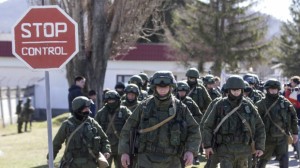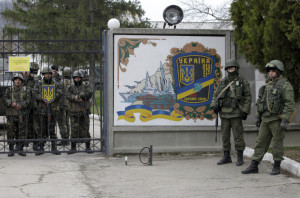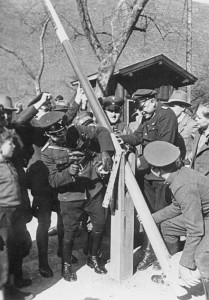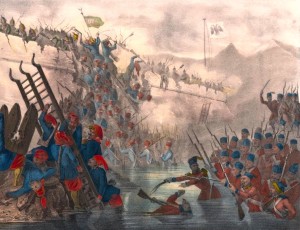
Russian soldiers on the march in Crimea. Stop signs only work if there is fear of a fine. Photo: Reuters/Baz Ratner
After the Sochi Winter Olympics, Vladimir Putin has won a gold in the Occupation Olympics. They are being held in Crimea, just across the Black Sea from Sochi.
Putin managed to seize Crimea without firing a shot. Not bad for taking over a population of 2 million people living on a peninsula slightly larger than Israel.
Will the Kremlin’s stealth blitzkrieg on Crimea now serve as a model for Putin to grab juicy chunks of Russian-speaking Eastern Ukraine, like the cities of Donetsk and Kharkiv?
Or has Monday’s dramatic 11 percent fall in Moscow’s stock market clipped the claws of the Russian bear?
Russia’s velvet glove invasion of Crimea displayed the same kind of ‘New Russia’ organizational expertise that we saw at the Sochi Olympics.
Here is the blow by blow:
First, armed men burst into Crimea’s parliament and forced legislators to vote for a new prime minister behind closed doors. Voting with guns in the room, this rump parliament elected a politician whose Russia Unity party had won three seats out 100 in Crimea’s last regional election.
With that democratic fig leaf in place, an incident was fabricated – a nighttime attack on the police headquarters in Crimea’s capital. The only problem: no neighbors heard shots, and no damage was shown to reporters.

Ukrainian soldiers wait inside the gates of their base Perevolnoye, Crimea, which was surrounded Sunday by 400 Russian soldiers and four Russian armored personnel carriers. Photo:AP/Darko Vojinovic
In response to that phony incident, Putin’s soldiers fanned out across Crimea, ostensibly to protect Russian-speakers — although none had been hurt. In an expertly choreographed operation, Russian soldiers surrounded all Ukrainian military bases, blockaded all ports and airports, and set up checkpoints with Russian flags on the two highways linking Crimea with the continent.
Although 13,000 Russian troops are believed to now be in Crimea, they all work in uniforms stripped in advance of insignia. Also indicative of the high level of planning, there were no reports of the foreign troops getting lost and asking for directions.
In the east, across a five kilometer strait from the Crimean city of Kerch, a column of Russian armored vehicles is reportedly massed at a Russian ferry landing. On Monday, Prime Minister Medvedev ordered a state construction company to start work on a $3 billion bridge across Kerch Strait, still an international waterway.
Oddly, as recently as Friday, Dmitri Trenin, director of Carnegie Moscow Center, was telling Western reporters that Putin was merely reacting to events, struggling to keep up. In reality, the invasion of Crimea followed a meticulously planned political-military blueprint. Crimea 2014 borrows a bit from Hungary 1956, a bit from Czechoslovakia 1968, and a bit from Afghanistan 1979
The occupation of Crimea is not the work of a rogue, hysterical admiral at the Russian Navy base in Sevastopol. Instead, a disciplined, unbroken chain of command runs straight back to the Kremlin.
For years, Russia prepared the political ground, bankrolling pro-Russian parties and associations in Crimea. Just last month, Vladislav Surkov, a top Kremlin political strategist, visited the peninsula. The new mayor of Sevastopol is a Russian citizen. Within hours of the arrival of Russian troops, crisp new Russian flags mysteriously erupted across Crimea, a strange sight in a region controlled by Ukraine since 1954.
Indeed after 70 years of control by Ukraine, it is unclear how many of Crimea’s Russian speakers really switched national allegiances overnight.

Germany’s 1938 annexation of German-speaking Austria, the Anschluss, was also greeted with smiles and the dismantling of border posts. Photo: Scherl
I have been to Crimea several times over the last seven years, visiting Yalta, Simferopol, Balaklava, and the Russian navy base city of Sevastopol. In Sevastopol, I talked to many people who were hostile toward Kyiv and the forced adoption of the Ukrainian language in schools. But it is unclear if Sevastopol residents speak for the 85 percent of Crimeans whose lives are not connected to this navy base city. Only 4 percent of Crimea’s population are believed to hold Russian passports.
My bet is that invasion opponents are lying low, waiting to express their views in the debate prior to a March 30 referendum on the peninsula’s future status. The choice: independence, continued autonomy within Ukraine, or absorption into Russia.
There is nothing terribly revolutionary about such a vote. The US territory of Puerto Rico, a former Spanish colony in the Caribbean, has held three such plebiscites since 1993. Scotland and Catalonia have similar votes planned.
But the Crimea vote will probably take place with the peninsula occupied by troops from Russia, a country where blatant ballot rigging in 2011 elections sparked massive public protest.
To have any credibility, Crimea’s poll will have to be overseen by international observers with serious democratic credentials. If the vote is rubber stamped by observers from Belarus, Kazakhstan, and Russia, the outside world will just laugh it off.
For now on Crimea, Ukrainian soldiers and Russian-speaking Ukrainian civilians are restraining themselves. Presumably, they want to avoid a shooting war between two Slavic Orthodox Christian peoples. But Kyiv’s government repeated this week that Crimea belongs to Ukraine. Ukrainian flags fly over many government buildings in Crimea. If a political solution is not found, anti-Russian guerrilla actions may follow.
The wild card in Crimea are the Tatars. This Muslim, Turkic speaking group accounts for 15 percent of the peninsula’s population. Crimean Tatars have big grudges against Russia.
Catherine the Great annexed Crimea in 1783, ending an independent Crimean Khanate. During 135 years under the Czars, relations between Tatars and Russians were often poor. But under the Soviets, they were disastrous. Civil war, famine and deportation cut the Crimean Tatar population in half.

The Crimean War of 1853-56 became a big power confrontation resulting in 500,000 dead soldiers from Russia, Turkey, France, Britain and Italy. Here, Turkish soldiers storm a Russian fort.
In 1944, Stalin deported all Crimean Tatars to Central Asia.
That same year, he deported all of Russia’s Chechens to Central Asia.
We know the legacy of Chechen bitterness: two wars since 1991 against Russian rule.
How Putin would respond to violent anti-Russian resistance by Crimean Tatars? With the scorched earth anti-Chechen policies of the first Putin presidency? Or the waterfall of rubles for Chechnya of the second Putin presidency?
Mustafa Dzhemilev, a former Soviet gulag prisoner and leader of the Crimean Tatars, reacted to Russia’s March 1 invasion by writing: Crimean Tatars “will fight. Even if we have to physically fight the usurpers. Units of Crimean Tatars who are battle-ready are being formed now.”
And here, geopolitics come into play. Putin said Tuesday that his goal is not to annex Crimea. But if he sets up a puppet republic, like Georgia’s Abkhazia, he will be stripping Ukraine of much its coastline and boldly asserting that the Black Sea is a Russian lake.
But, how would Turkey see the expansion of Russia’s coastline and territorial waters by 1,000 kilometers? Probably not well. Especially, if it comes with curbs on Crimea’s Tatars, Turkey ethnic and linguistic cousins. The Crimean Tatar diaspora has an influential lobby in Ankara.
For two centuries – from 1676 to 1878 – Russia fought 12 wars with Turkey over Black Sea real estate. The Crimean War of 1853-1856 drew France and Britain to the side of the Turks. Today, European powers are not threatening military action over Crimea. But from the point of view of Turkey, a NATO member, Kremlin control of Crimea would shift a balance of power that has existed in the Black Sea for a generation.
If Russia does not handle Crimea’s Tatars and Turkey with real diplomacy, Turkey can retaliate by blocking Russia’s oil shipments through the Bosphorus. About one third of Russia’s oil exports pass through that strategic choke point.
So what started as a smooth occupation of Crimea, could get quite messy, quite fast.
And how did the last Crimean War end in 1856?
Russia lost to an alliance of Turkey and the West.


6 responses to “Russia’s Occupation of Crimea: Blueprint for Eastern Ukraine?”
Certainly, the deployment of Russian troops had been preplanned in advance and went as an expertly choreographed operation. It and can be a blueprint for the eastern Ukraine, provided the interim government will continue their nationalistic ultra-right rhetoric.
For years, Russia has been preparing political grounds keeping in mind strategic importance of Crimea and the whole of Ukraine as the birthplace of Muscovy Rus.
The timing of the operation could hardly be chosen better. In addition, the pretext for the deployment doesn’t encounter serious objection, as the interim government was careless for not hiding their ultra-nationalism in the multinational country with strong Russian presence, and their far-right views widely pronounced. Very fast, they aliened many of those who might have supported the government and boosted fear among the population in the Eastern part of the country. Actually, they by themselves have split Ukraine into three parts: a) openly and fanatically antirussian in the West, b) moderately antirussian all around Kyiv and c) the rest of the country with no other way to go but in hands of strong eastern neighbor. From all evils, they choose the least threatening.
Mr. Putin did not hide that in KGB/FSB’s geostrategy Ukraine had been just a geographical notion, not a united nation, but divided in two with an eastern part of the territory having economical potential and the western part completely devoid of any such potential.
Ultra-nationalism and far-right views from the interim government aren’t welcomed from the EU countries and I observe the reluctance from them to speedily provide help or to openly confront Russia. I expect that Turkey will also demonstrate the same pragmatism.
The brotherly war between Slavonic orthodox Christian countries as Russia and Ukraine with strong Russian ethnicity in the latter would be a humanitarian disaster and unimaginable as there is hardly a family in Russia without Ukrainian roots, and vice versa, be it a granny or some other kin.
*careless interim government*?
Hey! Not so fast, Gennady. >>>
http://maidantranslations.com/2014/03/05/open-letter-of-ukrainian-jews-to-russian-federation-president-vladimir-putin/
AN OPEN LETTER OF UKRAINIAN JEWS AND OTHER ORGANIZATIONS TO RUSSIAN PRESIDENT PUTIN
{EXCERPT}
To the President of the Russian Federation Vladimir Vladimirovich
Putin
Mr. President!
We are Jewish citizens of Ukraine: businessmen, managers, public figures, scientists and scholars, artists and musicians. We are addressing you on behalf of the multi-national people of Ukraine, Ukraine’s national minorities, and on behalf of the Jewish community.
You have stated that Russia wants to protect the rights of the Russian-speaking citizens of the Crimea and all of Ukraine and that these rights have been trampled by the current Ukrainian government. Historically, Ukrainian Jews are also mostly Russian-speaking. Thus our opinion on what is happening carries no less weight than the opinion of those who advise and inform you.
We know that you are not easily fooled. This means that YOU must be CONSCIOUSLY PICKING and CHOOSING LIES AND SLANDER from the entire body of information on Ukraine. And you know very well that [V.] Yanukovich’s statement used to describe the situation…”Kyiv is full of armed people who have begun to ransack buildings, places of worship, and churches. Innocent people are suffering. People are being killed and robbed in the street’s…” is simply a LIE, from the first word to the very last.
The Russian speaking citizens of Ukraine are not being humiliated or discriminated against, their civil rights have not been infringed upon….Your certainty about the growth of anti-Semitism in Ukraine also does NOT correspond to the actual facts. Perhaps you got confused with Russia, where Jewish organizations have noticed a rise… in Anti-Semitism…
[re the scare tactics of using labels “Bandera followers” “Fascists”] Yes, we are well aware that the political opposition and forces of social protests WHO HAVE SECURED CHANGES FOR THE BETTER are made up of different groups. They include nationalistic groups, but even the most marginal do not… show Anti-Semitism or other xenophobic behavior…And we certainly know even our very few nationalists are well-controlled by civil society and the NEW UKRAINIAN GOVERNMENT – which is more than could be said for the Russian neo-Nazis, which are encouraged by YOUR security services!
We have a great mutual understanding with the new government, and partnerships in the works.. There are quite a few national minorities in the Cabinet of Ministers….
Unfortunately, we must admit that in recent days our stability has been threatened. AND this threat is COMING FROM THE RUSSIAN GOVERNMENT, namely, from YOU personally. It is YOUR policy of INCITING SEPARATISM and CRUDE PRESSURE on Ukraine and all Ukrainian people, including those that live in Crimea and the Ukrainian South-East….
Vladimir Vladimirovich, we do not wish to be “defended” by sundering Ukraine and annexing ITS territory. We decisively call for you NOT to intervene in internal Ukrainian affairs, to RETURN the Russian armed forces to their normal fixed peacetime location, and to STOP encouraging Pro-Russian separatism…
…We strongly urge you NOT to destabilize the situation in our country and to STOP your attempts of de-legitimizing the NEW UKRAINIAN GOVERNMENT.
Signed,
Joseph Zisels, Chairman of the Association of Jewish Communities and Organizations of Ukraine (VAAD), Ukraine, Executive Vice-President of the Congress of National Communities of Ukraine
(Includes over 20 other signatures thus far)
(Read the full letter-text in link above)
Stop beaming with pride, Mr. Brooke. LOL
Gold-medal invasion or not. Let’s not forget that >>
*Ousted president* V. Yanukovych (and his Party of Regions) re-negotiated gas pricing with Russia in the infamous Kharkiv Accords (or Pact) wherein a 30% gas discount from Russia would extend Russia’s LEASE on it’s Black Sea Fleet-Naval base in Crimea.
This ridiculous, short-sighted GAS-FOR-FLEET deal was conjured up by Yanukovych + the Party of Regions. AND THEN, of course, Russia deprived Ukrainian opposition of any chance to appeal to an arbitration court to challenge the contract signed back in 2010.
Re *The Kharkiv Accords > From: The Mortgaging of Sovereignty >>
…The gas subsidy and the accompanying agreement TO PROLONG THE LEASE OF THE BLACK SEA FLEET in Crimea ensured that Ukraine’s relations with Russia continued to be structured by opaque practices, economic dependency and LIMITED diplomatic and geopolitical options FOR UKRAINE, and made it more difficult to pursue urgent reforms. (At the same time [back then] Ukraine’s security cooperation with NATO was downgraded, and there were worrying infringements of democratic and civil freedoms)
In signing the Kharkiv Accords with Russia in April 2010, [“Now-Ousted”] President Yanukovych COMPROMISED important elements of Ukraine’s independence for the sake of internal consolidation and short-term economic and political gains. These concessions increased Russian pressure rather than defused it…
http://www.economist.com/blogs/easternapproaches/2010/09/ukraine
And as you see >>
In June 2010, Ukraine paid Gazprom around $234 per 1,000 cubic metres…HOWEVER… payments {to Russia} have since INCREASED annually: In August 2011, Ukraine paid Russia $350 per 1,000 cubic metres;[33] in November 2011 it paid $400 per 1,000 cubic meters;[34] and in January 2013 Ukraine paid $430 per 1,000 cubic metres.
http://www.ask.com/wiki/2010_Kharkiv_Pact?o=2801&qsrc=999&ad=doubleDown&an=apn&ap=ask.com
I say the Kharkiv Accords had ILLEGALLY replaced the 1997 20-year fleet-location lease treaty and that Russia’s Black Sea Fleet should be removed immediately from Ukraine’s territory due, in part, to the gross irregularity of that-Parliamentary voting. It was well-known that, unlike *ousted president* Yanukovych, Former Ukrainian President Yuschenko hadn’t wanted to renew Russia’s lease yet look at the clever way Ukraine’s Party of the Regions then took over – Moscow’s *velvet-glove* manipulation.
Altho the East/West sides of Ukraine have had their differences in the past, they have become united in the face of a foreign aggressor. “Unity” has become the new catch-phrase in both the East and West of Ukraine. The interim government in Kiev now realizes they must be inclusive of their Eastern countrymen or else lose half the country. And despite the Eastern part being linguistically Russian, they have flown under the Ukraine flag for the last 20 years, and do feel very much a part of that country. The oligarchs in these regions also fear living under a new Russian order, and have shifted alliance in-line with pro-EU and “unity” parties, and away from Russia.
In short, there is little love for Russia at the moment inside Ukraine, and I don’t see Putin being able to apply the same “blueprint” there as he did in the comparatively small and somewhat isolated Crimea, where Russian military presence has always been visible. Putin is currently bussing in hundreds of Russians from Russia to perform “pro-Russian” rallies in Donetsk and Kharkiv, but they are not gaining any real traction with the local Ukrainian population, are being forced out by local Ukrainian oligarchs in control of these areas, and can already be considered a failure.
[…] to recognize a Russian Crimea. But is secession illegal? 24. Voice of America: James Brooke, Russia’s Occupation of Crimea: Blueprint for Eastern Ukraine? 25. Reuters: Russian Foreign Ministry condemns “lawlessness” in east Ukraine. 26. New […]
Мне, как гражданину, жалко Украину и до чего она опустилась. Мы все догадываемся, что с ней будет. Новые власти подпишут соглашение с ЕС, экономика провалится в низ, они возьмут в долг, потом еще возьмут. Но денег ЕС и США будет не достаточно, а Россия уберет таможенные льготы (т.к. Украина вступила в союз с ЕС). Далее экономика рухнет окончательно. Если сейчас кашу заваривают парни с западной части, где нет промышленности, полезных ископаемых и сельского хозяйства (эту часть сейчас кормит восточная Украина), то после падения экономики на Майдан выйдет Восточная Украина. Эти парни работают на заводах и в шахтах. У них руки гораздо крепче, чем у подростков ныне протестующих. Ребята из Донецка просто подвесят за яйца нынешних зачинщиков смуты.
История, когда Украину и Россию хотели рассорить история уже знала, взять ,например, Петлюру, опять там Польша тут как тут, человек в своих националистических взглядах дошел до того, что его изгнал свой же народ. Петлюра от лица УНР заключил договор с Польшей о совместном походе на Киев, с целью изгнания советских войск. В обмен на поддержку УНР согласилась на установление границы между Польшей и Украиной по реке Збруч, тем самым признав вхождение Галиции и Волыни в состав Польши.
Жалко людей, которые хлебнут нужды. Сейчас Украина ходит с протянутой рукой, а в 20м веке руководитель Украины, а потом и СССР ботинком по столу в ООН стучал со словами “Я покажу вам кузькину мать”. И его не просто слушали, его боялись. И не Папуа Новая Гвинея боялись, а США, Великобритания, да что говорить, весь мир. А он взял и показал… На Кубе… А потом база США в Турции не модернизировалась черт знает сколько лет и до сих пор голая. И это сделал руководитель Украины, а потом и всей СССР.